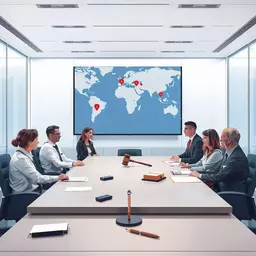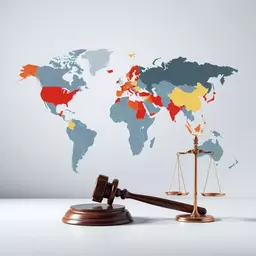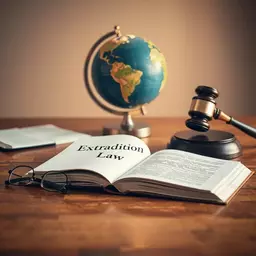Challenging Extradition: Key Strategies

Understanding extradition is not just a legal necessity; it is a critical aspect of international justice that can significantly impact lives. As countries increasingly cooperate on criminal matters, knowing the intricacies of this process can be your best defense.
What You Will Learn
- Extradition is a formal legal process for transferring individuals between countries for prosecution or serving sentences.
- The nature of the crime and existing treaties between nations play crucial roles in determining extradition outcomes.
- Having skilled legal representation is vital; it can significantly influence the extradition process and protect your rights.
- Understanding the dynamics between the requesting and requested nations helps in assessing potential extradition outcomes.
- A strong extradition defense attorney should have expertise in international law and a proven track record in extradition cases.
- Engaging attorneys in both the requesting and requested countries can create a comprehensive defense strategy.
- Legal aid organizations can provide essential representation and support for individuals who cannot afford private counsel.
Key Components of Extradition Process
Understanding the essential elements involved in the extradition process can help clarify how it works internationally. Below are the key players and steps that shape the extradition landscape. For those facing such challenges, working with experienced criminal defense lawyers in Dubai is crucial.
Requesting Nation
The nation that seeks extradition, providing evidence to support its case.
- Submits a formal request.
- Includes legal documentation.
Requested Nation
The nation that assesses the legality of the extradition request.
- Reviews submitted evidence.
- Determines compliance with treaties.
Legal Representation
Integral for individuals facing extradition requests.
- Helps contest the extradition.
- Advises on rights and legal options.
Extradition Process Steps
Key steps in the extradition process.
- Formal request submission.
- Review of legal standards.
- Right to contest the request.
Understanding Extradition: Key Concepts and Procedures
When we talk about extradition, it’s essential to grasp the core ideas and processes involved. Extradition is a legal mechanism allowing one country to surrender a suspected or convicted criminal to another country where the crime was committed. This process is vital for international cooperation and ensuring that justice is served across borders. At Extradition Interpol UAE, we take pride in shedding light on these complexities to empower individuals facing such situations.
One crucial aspect of extradition is understanding how it works in practice. The process can vary significantly based on the laws of the requesting and requested nations. Knowing these differences is critical for anyone involved in an extradition case, as it can influence the outcome of their situation. Let’s break down the fundamental components that shape the extradition landscape!
Defining Extradition: What You Need to Know
To put it simply, extradition is the formal request for surrendering a person from one nation to another for criminal prosecution or to serve a sentence. The fundamental premise is to uphold justice while respecting the legal frameworks of different countries. If you encounter an extradition request, it’s essential to understand your rights and the nature of the allegations against you.
Extradition can arise from various situations, including accusations of serious crimes like fraud, drug trafficking, or violent offenses. It is also important to consider the treaties in place between the involved nations, as they often dictate the terms and conditions under which extradition can occur.
- Understanding the nature of the crime.
- Determining if a treaty exists between the countries.
- Identifying potential defenses against extradition.
The Extradition Process Explained
The extradition process typically begins with a formal request from the country seeking extradition. This request is often supported by evidence, including arrest warrants and legal documentation. Once the request is submitted, the requested nation will conduct a review to determine if the request meets legal standards.
During this process, the individual facing extradition has the right to contest the request. Engaging with experienced legal counsel can make a significant difference. Having a skilled attorney who specializes in extradition law can help navigate the procedural complexities and advocate for your rights, especially when dealing with defense strategies for extradition cases.
Key Players in Extradition: Requesting vs. Requested Nations
In any extradition case, we can identify two main players: the requesting nation and the requested nation. The requesting nation is the one that seeks the extradition, often presenting evidence to support its case. On the other hand, the requested nation is responsible for evaluating the request and determining whether it meets local laws and treaty obligations.
The interplay between these nations is crucial. There might be legal, diplomatic, or even humanitarian considerations that influence the decision. Understanding this dynamic can provide valuable insight into the potential outcomes of an extradition request.
- Requesting Nation: Provides the basis for extradition.
- Requested Nation: Assesses the legality and implications of the request.
- Legal Representation: Essential for protecting rights during this process.
The Legal Framework: U.S. Extradition Laws and Treaties
Now that we have a solid foundation on extradition, let’s delve into the legal framework surrounding U.S. extradition laws and treaties. This area is crucial for anyone facing extradition to or from the United States. Understanding the treaties and obligations can help you build a strong defense against extradition attempts.
Stay tuned, as we unravel the complexities of extradition treaties and the constitutional protections available in these cases! Exciting insights await!
Pro Tip
Did you know? Engaging an attorney with specific experience in both the requesting and requested countries can drastically improve your chances of a favorable outcome during extradition proceedings. They can tailor your defense strategy to address the unique legal frameworks and potential challenges in both jurisdictions.
Frequently Asked Questions About Extradition
- What is extradition?
- Extradition is a formal legal process by which one country surrenders an individual to another country for prosecution or to serve a sentence for a crime committed in that country.
- What are the key components of the extradition process?
- The key components include the requesting nation (seeking extradition), the requested nation (assessing the legality of the request), legal representation for the individual, and specific steps like formal request submission, review of legal standards, and the right to contest the request.
- Why is legal representation important in extradition cases?
- Legal representation is vital because an experienced attorney can help navigate complex international laws, advocate for your rights, contest the extradition request, and provide advice on legal options, significantly influencing the outcome of the case.
- What is dual representation in extradition cases?
- Dual representation involves engaging legal counsel in both the requesting and requested countries. This approach allows for coordinated defense strategies, leverages local expertise, and facilitates streamlined communication between legal teams.
- Can legal aid help with extradition cases?
- Yes, legal aid organizations can provide essential support and representation for individuals who cannot afford private counsel. Many legal aid attorneys specialize in international law and offer cost-effective solutions to ensure access to justice.
Engaging Legal Representation: Why It Matters
When facing the complexities of extradition, having the right legal representation can make a world of difference. I often emphasize to my clients at Extradition Interpol UAE that a knowledgeable attorney can navigate the intricate laws, and they can effectively advocate for your rights. But what should you look for when choosing an extradition defense attorney?
The ideal attorney should possess a blend of legal expertise, experience in extradition cases, and a strong understanding of international law. They should also exhibit excellent communication skills, ensuring that you are kept informed every step of the way. Additionally, it’s vital that they have a proven track record in handling extradition matters, as this will give you confidence in their abilities.
Choosing the Right Extradition Defense Attorney
Finding the right legal counsel is not just about qualifications; it’s about finding someone who aligns with your needs. Here are some key qualities to consider:
- Experience in Extradition Law: Look for attorneys who specialize in international law and have dealt with extradition cases specifically.
- Strong Communication Skills: Your attorney should explain complex legal terms in a way that makes sense to you.
- Proven Track Record: Seek references or reviews from former clients who can attest to the attorney's effectiveness.
- Personalized Approach: A good attorney should take the time to understand your unique circumstances.
As someone deeply involved in extradition processes, I’ve seen how crucial these qualities are in building a robust defense. An attorney who understands the nuances of your case can significantly influence the outcome, providing you the support you need during such a challenging time. For more specific information, consider exploring resources on extradition laws in the UAE.
The Importance of Dual Representation in Extradition
In many extradition cases, having legal representation in both the requesting and requested countries can be invaluable. This dual representation can ensure a comprehensive defense strategy that considers all aspects of your case.
Benefits of Having Attorneys in Both Countries
Engaging attorneys from both jurisdictions can yield numerous advantages, including:
- Coordinated Defense Strategies: Attorneys can collaborate to devise a defense that addresses legal challenges in both countries.
- Local Expertise: Each attorney brings knowledge of their specific legal system, which is essential for navigating local laws.
- Streamlined Communication: Having legal teams in both countries can facilitate better information flow and quicker decision-making.
At Extradition Interpol UAE, I often advise clients on the merits of this dual representation, especially when facing complex extradition requests. It can make all the difference in your defense, particularly when dealing with issues like responding to an Interpol Red Notice.
Role of Legal Aid in Extradition Cases
Not everyone has access to private legal counsel, and this is where legal aid plays a vital role. Legal aid organizations can provide essential support and representation for individuals facing extradition, ensuring that everyone has access to justice.
These organizations often offer:
- Expert Legal Advice: Many legal aid attorneys specialize in international law, which is crucial for extradition cases.
- Cost-effective Solutions: Legal aid services can be provided at reduced costs or even for free, making them accessible to those in need.
- Broader Resources: Legal aid organizations often have extensive networks that can assist with various aspects of your case.
It's important to remember that no matter your situation, seeking legal help is an essential step. At Extradition Interpol UAE, I am committed to providing clear information and connecting individuals with the resources they need for effective legal representation.
Recap of Key Points
Here is a quick recap of the important points discussed in the article:
- Understanding Extradition: Extradition is a legal process for transferring a suspected or convicted criminal from one country to another.
- Extradition Process: It begins with a formal request supported by evidence, and individuals have the right to contest the request.
- Key Players: The requesting nation presents the case, while the requested nation assesses the legality of the extradition.
- Legal Representation: Engaging a knowledgeable attorney is crucial for navigating the complexities of extradition law.
- Qualities of a Good Attorney: Look for experience in extradition law, strong communication skills, a proven track record, and a personalized approach.
- Dual Representation Benefits: Having attorneys in both the requesting and requested countries allows for coordinated defense strategies and local expertise.
- Role of Legal Aid: Legal aid organizations provide essential support for individuals without access to private counsel, ensuring everyone has access to justice.



